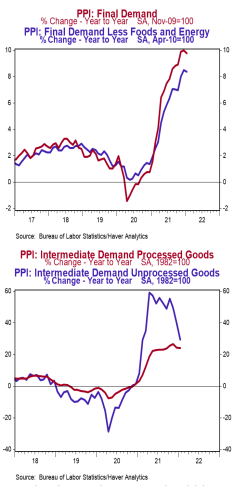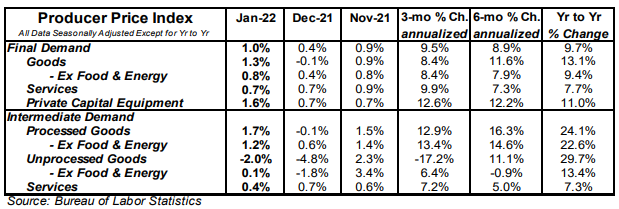- Industrial production increased 1.4% in January, easily beating the consensus expected gain of 0.5%. Utilities output rose 9.9% in January, while mining increased 1.0%.
- Manufacturing, which excludes mining/utilities, increased 0.2% in January. Auto production fell 0.9%, while non-auto manufacturing rose 0.3%. Auto production is down 6.2% versus a year ago, while non-auto manufacturing is up 3.3%.
- The production of high-tech equipment fell 0.1% in January but is up 5.3% versus a year ago.
- Overall capacity utilization increased to 77.6% in January from 76.6% in December. Manufacturing capacity utilization rose to 77.3% in January from 77.2%.
Implications:
US industrial activity soared in January, rising 1.4% to match the strongest monthly gain in nearly a year. Moreover, the acceleration in activity was broad-based in January, with most major categories posting gains. However, the details of the report were not quite as strong as the headline. The utilities sector, which is volatile from month to month and largely dependent on weather, rose 9.9% in January, the largest monthly increase for this category since records started in 1939! That’s what we get when we go from an unusually warm December to an unusually cold January. Meanwhile, manufacturing production rose a more tepid 0.2% in January. Notably, all of the gain came from manufacturing outside the auto sector, where activity rose 0.3%. Auto manufacturing continued to be a headwind for overall manufacturing in January, falling for the second month in a row and demonstrating that supply-chain issues like the shortage of semiconductors remain a problem. Finally, the mining sector (think oil rigs in the Gulf) was another bright spot in January, posting a 1.0% gain. We expect this sector to continue to be a tailwind for overall industrial production in the months ahead, with oil prices recently rising above $90 a barrel for the first time since 2014 incentivizing more production. Also keep in mind that January was the month when COVID cases in the US were hitting record highs due to the highly contagious Omicron variant, which likely held down economic activity to some degree. As the Omicron wave passes, we expect the upward trend in industrial activity to accelerate. Business inventories remain lean, order backlogs are elevated, and demand continues to outstrip supply. For example, today’s gain puts industrial production 2.2% above pre-pandemic levels. Meanwhile, this morning’s report on retail sales showed that even after adjusting for inflation, “real” retail sales are up 13.5% over that same time period. Ongoing issues with supply chains and labor shortages are hampering a more robust rise in activity, with job openings in the manufacturing sector currently more than double pre-pandemic levels. This mismatch between supply and demand, shows why inflation has accelerated so sharply.





